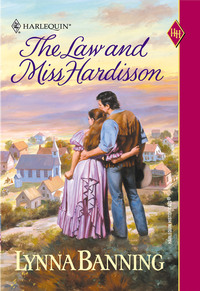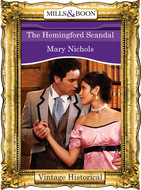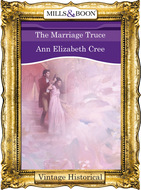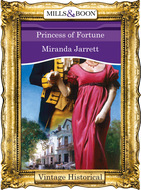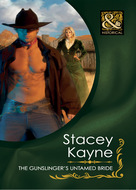Kitab fayl olaraq yüklənə bilməz, yalnız mobil tətbiq və ya onlayn olaraq veb saytımızda oxuna bilər.
Kitabı oxu: «The Law And Miss Hardisson»
Just thinking about three long nights playing poker with the prettiest lawyer west of the Mississippi made Clayton Black’s skin tingle.
There were some things about Irene Hardisson he’d give his eyeteeth to know—like what she thought about at night. What she wanted in life. What she looked like underneath all those flounces.
That settled it. He’d stay. For a while. A short while. Might do him good to hang his hat somewhere he was actually wanted for a change. But she was no rambling rose. She was a lady and he wouldn’t compromise her. And he’d work damn hard to keep her from sticking in his memory when he rode away.
Praise for Lynna Banning’s previous titles
PLUM CREEK BRIDE
“…pathos and humor blend in a plot that glows with perception and dignity.”
—Affaire de Coeur
WILDWOOD
“5 *s.”
—Heartland Critiques
WESTERN ROSE
“…warm, wonderful and witty—a winning combination from a bright new talent.”
—Award-winning author Theresa Michaels
The Law and Miss Hardisson
Harlequin Historical #537
#535 THE STOLEN BRIDE
Susan Spencer Paul
#536 SILK AND STEEL
Theresa Michaels
#538 MONTANA MAN
Jillian Hart
The Law and Miss Hardisson
Lynna Banning
MILLS & BOON
Before you start reading, why not sign up?
Thank you for downloading this Mills & Boon book. If you want to hear about exclusive discounts, special offers and competitions, sign up to our email newsletter today!
Or simply visit
Mills & Boon emails are completely free to receive and you can unsubscribe at any time via the link in any email we send you.
Available from Harlequin Historicals and LYNNA BANNING
Harlequin Historicals
Western Rose #310
Wildwood #374
Lost Acres Bride #437
Plum Creek Bride #474
The Law and Miss Hardisson #537
To my aunt, Jean Banning Strickland
With special thanks to Suzanne Barrett, Ida Hills, Norma Pulle and Leslie Yarnes Sugai.
Contents
Prologue
Chapter One
Chapter Two
Chapter Three
Chapter Four
Chapter Five
Chapter Six
Chapter Seven
Chapter Eight
Chapter Nine
Chapter Ten
Chapter Eleven
Chapter Twelve
Chapter Thirteen
Chapter Fourteen
Chapter Fifteen
Chapter Sixteen
Chapter Seventeen
Chapter Eighteen
Chapter Nineteen
Chapter Twenty
Epilogue
Author Note
Prologue
All he could remember was there were cherries on her hat. Bright, shiny, red cherries, nodding over her forehead. Nothing else penetrated the fog of pain and nausea while they’d loaded him into the stagecoach. He slumped into the corner seat and set himself to endure the thirty-mile trip across the eastern Oregon plains to Cedarville, where the driver claimed there was a doctor.
Early that morning he’d been full of beans and vinegar, anxious to get this job over with and head back to Texas, anxious for a meal he didn’t have to cook over a fire he built himself. That ended when someone shot him off his horse and the gelding dragged him a quarter of a mile before he could get his boot out of the stirrup.
“He’s probably broke some ribs and maybe busted his arm in a couple places,” the stage driver had said. Someone sloshed whiskey down his throat and the cherry hat lady sniffed.
There were other passengers, but the one he vaguely remembered was the one who was dressed Eastern and acted mighty prim and proper. The driver suggested she might care to wait for another stage, but she gave him a frosty look and in a tone like flint said, “I am expected in Crazy Creek, and I intend to get there.” After a pause, she added, “Is he more drunk, or more hurt?”
“Oh, Lordy, ma’am. He ain’t a drinkin’ man. But he shore is hurt. Somebody musta bushwacked him, cuz he’s good with a gun, bein’ a Texas Ranger, y’see. He ain’t likely to lose a fair fight. He’s hurt, sure enough.”
“Very well. He is as anxious as I am to get to town. Why delay further?”
The driver grunted.
When the coach started up, his head slid forward against the siding. Then something soft and warm cushioned his cheek and he vaguely remembered a wet, cool cloth against his face and a not-to-be-denied voice saying crisply, “Drink this,” and the burn of straight whiskey from a tilted bottle.
When they pulled into the dusty town, he remembered that she climbed out and started giving orders. “Watch his head. If the doctor is nearby, you men can carry him.”
“Yes, ma’am,” the driver said.
“Wait!” she commanded. “Should he have more whiskey if the pain gets worse?”
“We ain’t got more, ma’am. Only had one bottle.”
She looked up and down the dusty trail that passed for a street, pulled a bill from her reticule and handed it over. “Get whatever you think he might need, and bring me the change.”
They manhandled him out of the coach and he thought dimly that his chest might explode with the pain. But the only thing he could recall clearly were the bright red cherries on her hat.
When he finally regained consciousness, he was on a bed in the corner of the doctor’s office, trussed up in tape and bandages with one helluva headache.
Chapter One
Crazy Creek, Oregon
1883
Clayton Black drew rein at the top of the hill and gazed down at the secluded valley stretching below him. He sucked in some air, winced at the familiar pain in his rib cage and let his breath out easy. Two of his ribs were bruised, the doctor had said. One was cracked. He couldn’t take a breath without being reminded.
He rubbed his injured arm as he gazed down at the creek twisting through the land. Bordered by gray-green willow and cottonwood trees, it lazily encircled the tidy town and then meandered off to the west.
He hurt enough that camping out another night held little appeal, but still he hesitated. Crazy Creek looked too civilized to attract an outlaw like Brance Fortier, but you never knew. Maybe Fortier had passed through here. Maybe somebody had seen him, would remember which way he was headed. Not likely he’d stay long in a town as peaceful as this.
Clayton didn’t plan to, either. Just the look of the place—trim picket fences, rosebushes in bloom, boardwalks on both sides of the streets—gave him the jitters. Too orderly. Too civilized.
He squinted under the wide brim of his hat. Newspaper office, mercantile, hotel, livery stable, barbershop, sheriff’s office. A gleaming white church steeple drew his gaze and he groaned. It was one of those towns full of pious people and prayer meetings. A white steeple town.
Too much like his mother’s meticulously kept plantation in Louisiana, and not enough like the dusty, ramshackle ranch in East Texas he and his father called home. Or had, before Fortier killed him.
A lump the size of a walnut swelled in his throat. I’ll get him, Pa. You just lie easy and don’t worry. If he got back alive, he vowed he’d plant a sweet-briar rosebush on the graves of his father and his sister.
Once more, Clayton directed his gaze on the little town curled in the lap of the green valley. The late morning sun poured down like honey. The landscape was so different from the dry, sagebrush-dotted desert he’d ridden over the past four days for a moment he thought the view might be a mirage, a glimpse of some lush emerald and gold paradise. Only thirty miles from Cedarville, but it looked like another planet.
He’d bet money it was Fortier who had winged him and then kicked in his ribs. All he remembered was the thump and sting of the bullet in his shoulder and waking up with his arm in a sling. Now, in addition to the warrant he carried for the outlaw, he had a personal score to settle. His crippled arm was his gun arm. It would be weeks, maybe months, before he could shoot straight.
He tossed back his chin-length black hair and ran his tongue over dry lips. He knew Fortier had passed this way; the outlaw’s trail led straight toward town. He lifted the reins and stepped his horse back from the cliff edge. “C’mon, Rebel. Time to go.”
Funny name, Crazy Creek. There was something he should remember about it, but he couldn’t recall what. Since the shooting, there were still things he couldn’t remember, but something about the place tugged at his insides. It was so pretty and serene it looked painted. Except for that boy down there, larruping through an alfalfa field after his dog, it hardly looked real.
He urged his mount forward, letting it pick its own way down the steep path. However out of place the trim little village made him feel, he’d have to ask around. If he was lucky, he’d pick up Fortier’s trail on the other side of town.
And if he wasn’t lucky…well, then, Fortier would shoot him in the back, like he’d shot Pa and Jannie, and that would be that. In some ways, it would be a relief.
Clayton’s lips twitched into a lopsided smile. He knew only one thing for certain—he would capture his father’s killer or die trying.
The look of the town below him, so settled, so civilized, made him nervous. Yeah, a white steeple town, full of people with refined manners and an extra helping of bigotry.
He pursed his mouth and tried to whistle. No way. He didn’t belong here.
Hell, what was new about that? Being half Cherokee meant he didn’t much belong anywhere.
“There,” Irene murmured in satisfaction. She rearranged the in-work file on the large oak desk and glanced approvingly at her well-organized office. It looked much more tidy since she’d washed the front windows and painted the rough pine walls. The sheriff wouldn’t mind. Besides, he was out of town.
Her office adjoined his, but he didn’t own the building. Nate Cummings, the undertaker, did.
She’d paid Nate three months’ rent in advance and the stocky gray-bearded man had let her do anything she wanted. She’d even spread a large oval braided rug over the plank floor. While Nate’s watery blue eyes had widened, he had snapped his mouth shut and said nothing.
“Crazy Creek never had no lawyer before,” Nate told her. She’d been famous ever since her first afternoon in town when she’d hung out the engraved metal sign she’d brought from the East and promptly got involved in that hostage standoff. Now her pending work file—actually the oval top from one of her hatboxes—overflowed with appointment requests. In the sheriff’s absence, she noted with a flush of pride, people turned to her for advice. They had waited years to settle property boundary questions, draw up wills, have marriages and births recorded. Townsfolk streamed into her office like spawning salmon.
On impulse, she moved to the window. Oh, how good it was to be here in the West! She never wanted to see Philadelphia again. She’d had enough of wealthy clients suing other wealthy clients over some Thoroughbred’s bloodlines. Real law—the constitutional rights she believed in with every fiber of her being—was needed in the West. Out here, the country was still growing. Back East, life—at least for her—had stopped when pneumonia took her father. After that, she couldn’t wait to leave.
Irene’s throat closed. She decided to busy herself dusting out her desk drawers. Settling herself on the hard oak swivel chair, she pulled open the bottom right-hand drawer and leaned over to inspect the contents. A dried-up bottle of Sanford’s ink, two dusty cigars, and—
The door banged open. “Where’s the sheriff?” a low, gravelly voice inquired.
“Gone,” Irene said without looking up. “Is there something I can—”
“Gone where?”
Irene raised her gaze to the doorway and stopped breathing. A tall man stood before her, one arm in a black cloth sling, his leather vest coated with trail dust, his tanned face impassive. Steady gray eyes held hers. “Gone where?” he prompted.
Irene jerked to attention. “Gone, um, gone—” She couldn’t think with him staring at her that way! “Gone…hunting!”
“Where’s this I. P. Hardisson, then? Sign says he’s a lawyer.”
“He is. I mean, I am! I am I. P. Hardisson.”
He looked her over for so long she felt tingles at the back of her neck. “Irene Pennfield Hardisson,” she supplied. Something about the man unnerved her, but she managed to keep her voice steady. “Attorney-at-law,” she added unnecessarily.
“Clayton Black, Texas Ranger.” His eyes still rested on hers, but he didn’t move. Tall and lean, he just stood and looked his fill.
“Mr. Black.” Irene extended her hand.
He gave her fingers a quick, hard shake with his left hand, then stuffed his hand into his back pocket. “You ever hear of anyone by the name of Fortier?”
“Brance Fortier?”
“That’s him. You know him?”
“N-not exactly.”
“Where is he?”
“I—he was in jail when I arrived in Crazy Creek—”
“Jail!”
“Yes, but they released him.”
“They what?” His eyes turned to cold steel.
“Well, I—he was accused of stealing a—”
“I’ll bet,” Clayton said in a dry voice. “Probably ran his own horse to death. So they let him go?”
It was more an accusation than a question. Irene’s resolve stiffened. “A man,” she pronounced in measured tones, “is presumed innocent until proven—”
“Horse-rocks!”
“Please let me finish.”
Clayton took two long steps forward and leaned over her desk. “Okay,” he said. “Finish.”
She blinked. His face was so close to hers she could see the flush of anger on his high cheekbones. Hair black as midnight swept his collar.
“—until proven guilty,” she concluded.
“Yeah, I’ve heard that. But what I want with Fortier hasn’t anything to do with horse-thievin’, so where do I find him?”
“I have no idea where he went after the hostage exchange.”
“Hostage exchange! Who was involved in that?”
“That you will have to ask the sheriff,” she replied with a sniff. She didn’t want to admit it was she who had negotiated the exchange. He looked mad enough as it was.
“Well now, I can’t do that now, can I? Seein’ as he’s gone ‘hunting.’ Just what is he hunting, Miss Hardisson?”
Something about the man’s deliberate, self-confident manner made her insides fluttery.
“I cannot say.”
“Can’t?” he pressed.
“Will not,” she amended. She had no legal leg to stand on, and she knew it. She swept the crumbling cigars into the wastebasket beside her desk and tried to think. For some reason she didn’t want to reveal to this man her role in Brance Fortier’s release. She looked him in the eye and shook her head.
“You’re obstructing justice, Miss Hardisson. I have a warrant for Fortier’s arrest.” With his good arm, he withdrew the paper from his inside vest pocket and unfolded it on her desk.
Irene scanned the document. “Murder! Oh, my.”
“So you see, ma’am, you’ve gone and put your legal foot right in the middle of my job, and I suggest—”
“This is Oregon, not Texas,” she enunciated with care. “Have you authority in Oregon?”
She prayed he would not challenge the point. She’d read law under her father in Pennsylvania; she hadn’t been out West long enough to know Oregon law.
He ignored her question. “When did you see Fortier last?”
“A few days ago. I went over to the jail—”
“And released him,” he finished for her. “I’ll bet he lit out within ten minutes.”
Irene drew in her breath and exhaled. “It was more like five minutes.”
Clayton laughed out loud. “Brance Fortier’s one of the old Cortina gang. I doubt he’s within a hundred miles of this valley by now.”
“I am quite sure he will be back within the week.” She started to rise.
Clayton pinned her wrist to the desk. “Either you are a damn fool,” he said quietly, “or you are a damn good liar.”
Irene wrenched her hand free and stood up, breathing hard. “Mr. Black, if you will excuse me, I have business elsewhere. Good afternoon.”
She slammed the desk drawer shut, yanked her black silk parasol from the china stand beside her desk and marched past him to the door.
He got there ahead of her.
“Stand aside, please,” she ordered. She looked up at him with fire in her eyes. He noted they were an odd shade of green, and the mass of dark chestnut hair piled on top of her head seemed too heavy for the slim neck. The rest of her was pure woman. Small waist, gently flaring hips, skin like peach silk. The soft green dress clung to her upper torso in a way that made his mouth go dry, and her large, expressive eyes, framed by definite eyebrows and thick, black lashes, looked fearless.
He folded his good arm over his sling, content to block her way. She smelled good. Sweet and clean, like soap. He inclined his head toward her to get another whiff.
And then he spied something over her shoulder. Something she had forgotten in her fury. It sat on a glass-fronted bookcase behind the desk, and he hadn’t seen it because he’d been focusing on those green eyes of hers.
Balls of fire, there couldn’t be more than one creation like that in the entire country!
And there it was, right smack in front of him. That straw hat with the shiny red cherries on top.
Chapter Two
The parasol opened with a swish. Beneath the arch of black silk a pair of flashing eyes held his. “Why are you staring at me like that?”
“You’re the lady on the stagecoach!” Clayton managed. “I recognize your hat.”
The green eyes widened. “My hat?”
“Ma’am, I was badly wounded. As I recall, you got some whiskey for me, and for that I am eternally grate—”
“Whiskey!” She studied his face, then inspected the sling on his arm. Her face changed. “Oh, yes, I remember now.”
“The doctor in Cedarville dug out the bullet and taped up my ribs. I’m obliged to you, Miss Hardisson.”
Her dark brows drew into a frown. “It was Brance Fortier who shot you! That’s why you want to find him, is it not? To settle the score?”
“Not exactly.” Clayton shifted his weight, leaned his aching back against the closed door of her office. “To tell you the truth, ma’am, I don’t know who shot me. Never saw him. Might’ve been Fortier. Might’ve been somebody else. Doesn’t much matter, since I’m takin’ Fortier back to Texas soon as I find him, to stand trial for murder.”
“I am sorry, Mr. Black. Brance Fortier is not going anywhere until he is tried for horse theft here in Clackamas County.”
She said it with such conviction Clayton gritted his teeth. Why, why was he saddled with this annoyingly stubborn lady? She sure didn’t act as soft as she looked, small and fragile in green-sprigged muslin puffs and ribbons. She acted like she knew something he didn’t, and it got under his skin. He needed to find out where Fortier had gone and get the hell out of this place! The town and everything in it—especially her—made him uneasy. All he wanted was Fortier and justice. Swift and efficient.
And Irene Hardisson knew which direction he was headed. He cleared his throat. “Miss Hardisson, I’m dead tired and hot and sweaty from near twenty hours in the saddle. If you don’t mind, we’ll continue this skirmish later.”
She sent him a look that would fry bacon. “Well, I never!” Hands propped on her hips, she stood toe-to-toe with him.
Clayton stifled a groan, then spun on his heel and headed for the door. “I need some answers. I’ll be back after supper.”
“I will not be in after supper,” she snapped. “I will be at my home.”
“Fine,” he shot back. “Where do you live?”
“I did not mean for you to call, Mr. Black. I am not receiving. I meant—”
“At the hotel, then. Later. I’ll probably pick up a poker game, see what I can find out.”
With a nod in her direction, he bolted through the doorway and was gone.
Openmouthed, Irene listened to his boots clump down the boardwalk. She most certainly would not see him later! Their business, such as it was, had been completed. She had absolutely no wish to see Clayton Black ever again.
On the stagecoach she had not paid that much attention to the injured man they had loaded aboard other than to supply some pain-deadening whiskey. He had looked every bit the lowlife. Now, the man might be dusty and rumpled, but with his tanned, even features and straight, dark hair, she noted he was extraordinarily handsome. She nudged the awareness to the back of her mind. A moment ago he had stood there, assessing her with those cold gray eyes, and she had felt…well, intimidated.
So what if he is a lawman? A Texas Ranger, or so he said. That did not mean he was a gentleman. “Gentlemen,” she announced to her pile of waiting papers, “do not intimidate ladies.”
She swept to the bookcase behind the desk and retrieved her straw hat. Decorated as it was with shiny red fruit, it had cost her four whole dollars at Whyte’s in Philadelphia. She’d bought it because it reminded her of her father; he had adored cherries.
“And a poker-playing lawman at that,” she muttered. “Papa always said that was the devil’s game. That’s why he taught me to play chess instead.”
She pulled the door closed behind her, locked it with the key she dug out of her reticule, and headed down Park Street to her cottage.
Her spirits drooped. Another restless night with nothing to occupy her mind but how lonely she felt, so far away from everything familiar to her—the solid brick house she’d grown up in, her father’s library of books, her father himself, dead these past four months.
On the surface, she maintained the cool, controlled manner that had been bred into her, but inside, when she was alone, she had to face her real feelings. Her soul ached at the loss of her father. She would never see his dear, bewhiskered face again.
Her shoulders sagged. She was two thousand miles from the cobblestone streets of Philadelphia, the comfortable, welcoming home she’d always known. She longed to be there now, longed to let Nora help her out of her stays and petticoats, draw her a bath, bring supper on a tray. For all the years she could remember, the plump housekeeper had loved her and taken care of her, just like a mother. Oh, why had she ever left?
Because it was not enough, a voice inside reminded. You wanted to make your own way, be a part of the new Western frontier.
Well, now she was part of it, God help her! She supposed men like Clayton Black went with the territory. Men who hunted other men. Men who intimidated women. Men who frequented smoke-filled rooms playing…poker.
It was only a game, wasn’t it? Why had Father been so against it?
She loved games, excelled at them. Loved the feeling of control she gained when she mastered the rules. She guessed her joy in such activity was an antidote to losing her mother when she was four, and the confusion that overwhelmed her later when her father began to fail.
She had studied law not only to uphold the name of the Hardisson law firm but because it offered her a kind of emotional security. She could not predict life or death, but with intelligence and knowledge of the rules, she could dictate the outcome of a trial. Or a game.
The thought pulled at her as she turned the corner across from the town square and sped toward the white frame house that was now hers. Inside was safety and warmth. Predictability. After her encounter with Clayton Black, she felt more than the usual need for such things.
“But at least I had the last word,” she announced to her empty front parlor. She halted in front of four rolls of rose-sprigged wallpaper she’d left leaning against the stepladder. “Or did I?”
She could not remember. When he had looked at her, under her corset her heart began to hammer like a piston and her thoughts flew up and away like so many dandelion puffs.
She smoothed her palm over the carved oak banister in the hall and stepped with exaggerated dignity onto the first stair. “I am becoming a notional old maid with a silly brain that goes into flutters over a Texas Ranger’s smile! Well, I will have none of that, thank you. None whatsoever!” She reached the top landing and marched to her bedroom door.
Inside, the golden afternoon light poured in the open window, bringing the scent of roses and Mrs. Gerstein’s honeysuckle vine from the neighboring yard. Irene shut her eyes. Papa is gone.
She opened her eyes and spoke aloud to the windowpane. “And he is never coming back.”
“Cut the cards, mister?”
Clayton reached out his good arm and split the deck. He’d played seven hands, won the pot after the last one, and now his mind wandered away from the game while the dealer slapped cards down onto the scarred oak table.
Sweat crawled down his back. He felt off balance. He’d unpinned the badge on his vest to forestall questions, had been invited to join the game with no inquiries. He wondered if the five men gathered around the table would be as friendly if they knew he was a Texas Ranger. If they knew he was after information, they might clam up.
He didn’t belong here. If they knew he was half Cherokee, he wouldn’t even be allowed in. The sign in the hotel lobby said No Indians. He longed to get up and leave, but it was too early to break up the game. He hadn’t learned a damn thing about Fortier so far. Maybe he was sitting at the wrong campfire.
Irene Hardisson knew more than she was telling, he could feel it in his gut. It was her he had to talk to.
She sure hadn’t had much to say to him this afternoon!
A grin threatened to crack his dry lips. Man, she had a temper. She was starched stiff as a corset stay!
He shifted in his chair. Even after two whiskeys, his shoulder hurt and his ribs still ached. A soft bed with clean sheets beckoned upstairs—why not wait till morning to talk to the lady lawyer?
Yeah, Clayton, mi amigo. Why not?
Because she smelled good. And she looked soft and frilly and her dark hair shone like firelight licking coals, and…she smelled good. Like a woman.
And because he was hungry for something he couldn’t even begin to name. Someone to talk to. Somewhere to belong.
Just for tonight. Tomorrow he’d head out and try to pick up Fortier’s trail. It made him nervous to stay in one place too long. But tonight…tonight he wished—
“Mr. Black?”
In an instant, the entire table of men rose to their feet. Clayton’s cards slipped from his hand and scattered, most of them faceup. Without turning his head, he knew who it was. In a town like this, men stood up when a lady entered a room.
He stood up, too, removing his hat as he did so, just like his momma had taught him.
“Miss Hardisson.”
“I have come to apologize,” she said in a low voice.
With his left hand, he grasped her elbow and turned her toward the entrance. “You shouldn’t be in here, this is a—”
“I know what it is. A card room.”
“The lady is welcome to stay,” one of the men offered.
“No, thank you,” came her crisp reply. “I came only to speak to Mr. Black about…a certain matter.”
Clayton steered her through the doorway and into the hotel foyer, then turned her to face him. “About Brance Fortier?”
The dark lashes descended, but not before he saw that her eyes looked odd. Uncertain.
“Miss Hardisson,” he prompted. “About Fortier?”
“About poker.” She blurted the words and shut her lips tight.
“What?” he said, louder than he intended.
“Poker,” she repeated. “I want you to teach me how to play poker.”
Clayton released her arm and took a step backward. “Are you crazy? Ladies don’t play poker!”
“Why not? I am skilled at hearts and baccarat. Why not poker?”
He searched for a reply. “It’s…complicated.”
“I am quite intelligent. I want to learn.”
“Well, I’ll be—what the hell for?” His voice came out so loud the drowsing hotel clerk jerked awake. “What the hell for?” he said more softly.
Her face changed. “I have my reasons.”
Clayton frowned. In the space of a few seconds, her expression had gone from hopeful to determined and back to hopeful. It didn’t make any sense.
They looked at each other in silence. “You want—need—something from me,” she said at last. “And I want something from you.”
He knew she didn’t mean it the way it sounded, but his heart leaped anyway. The word “want” on her tongue made his throat go dry.
“And that is?”
“Teach me.”
Under his jeans, Clayton felt his groin tighten. “To play poker,” he said.
“Yes.”
“Why should I?”
“Because,” she said, her voice even, her face studiedly calm, “I can make it worth your while.”
His heartbeat stuttered. She was an innocent, so naive she didn’t know how suggestive her words were, especially to a starving man. He cleared his throat and worked to keep his voice steady. “Just what are you prepared to offer?”
Irene cocked her head. “Information. About Brance Fortier.”
He knew he was gaping at her. Twice he had to remind himself to close his mouth. Disappointment that her bargaining chip was limited to information warred with curiosity about what she knew.
“It’s a deal.”
“Very well. Shall we commence here, in the hotel?”
“Too public, you bein’ a lady and all. You live in town, I reckon. How about your place?”
“That would not be at all proper, I’m afraid. We would have no chaperon.”
Chaperon! She talks about making it worth my while and then… Right. She’s offering information. Just information.
“What about your law office?”
She considered his suggestion, then nodded. “I’ll fetch a pot of coffee.”
“I’ll bring a deck of cards.” And all the restraint I can muster. Damn, but she looked pretty when she smiled. Didn’t do it very often, but it was like the sun in summer when she did.
Pulsuz fraqment bitdi.

